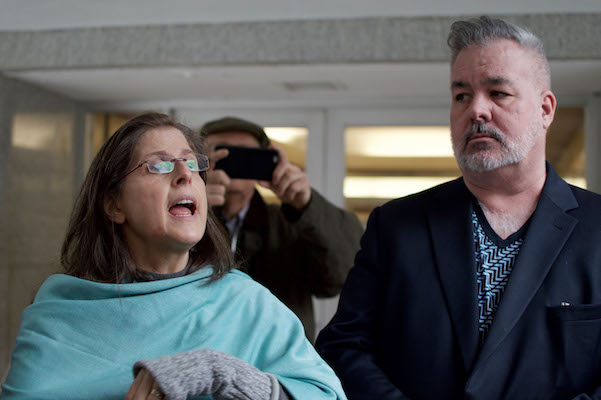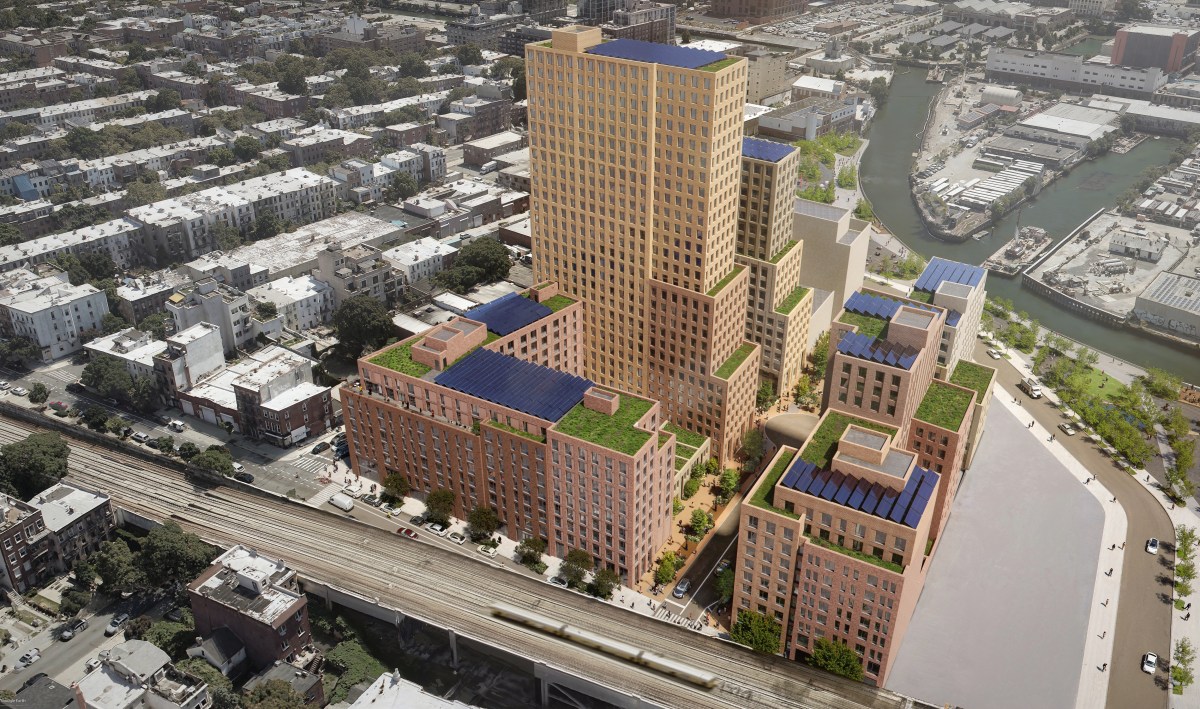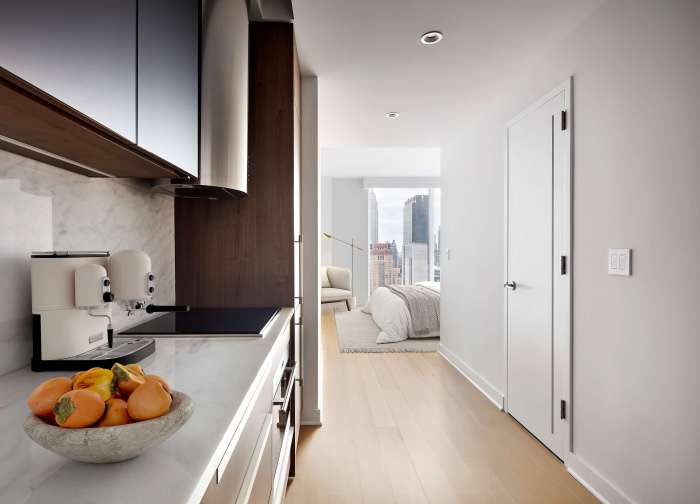
BY JACKSON CHEN | A Department of Finance decision based on regulations about city tax lots has halted an unprecedented project that would have floated a 10-story condo above an existing seven-story rental building at 711 West End Avenue.
The ambitious development, located on the block between West 94th and 95th Streets, would sit on a platform to be held up by 10 support columns around the perimeter of the existing building. While occupying the same site, the two buildings would be separated by a gap of several feet between the existing structure’s roof and the proposed development’s ground floor.
The project was approved by the city’s Department of Buildings and secured its building permits just under the wire – a week before the Landmarks Preservation Commission, on June 25, 2015, extended the Riverside-West End Historic District to include that block of West End Avenue.
However, the DOF recently ruled that the developers – SJP Properties and P2BVentures, organized as 305 West 95th Street Developer LLC – could not create a new tax lot for the proposed development, which would allow for the construction of condominiums at the site of a rent-stabilized residential building, according to a February 27 letter sent to elected officials.
The letter from DOF’s director of intergovernmental affairs, Sheelah Feinberg, was sent to State Assemblymember Daniel O’Donnell and City Councilmember Helen Rosenthal.
“Our property division met with the developer in 2016 and explained that we could not accommodate their request to create two tax lots,” Feinberg wrote in the letter obtained by Manhattan Express.
O’Donnell said he was aware of the agency’s decision about a month ago, but waited to have it in writing before sharing the news with the residents of 711 West End Avenue who oppose the project.
“In order for them to build the building on top of this building, they would require a separate tax lot to do that,” O’Donnell said at a February 27 press conference outside of the building. “The city has said they will not and cannot do that.”
Rosenthal has also worked with the tenants in fighting the proposal. To date, opposition efforts had failed to stop the project from moving forward.
“We made it clear to the administration that this is not a project that the community wants, and the community has spoken loudly,” Rosenthal said. “The Department of Finance, at the end of the day, has made a solid ruling… [denying] having two tax lots on the single physical space.”
She added, “This is one building, it will remain one building with one tax lot.”

Stephanie Cooper, a nearly 50-year resident of the building, is relieved the city has halted the project – at least for now. She and many other residents who rallied outside the building as O’Donnell and Rosenthal announced the DOF decision remain concerned.
Cooper has opposed the project since it was first announced and created the Tenants Action Group with other residents in response. The group retained Richard Herschlag, a civil and structural engineer, to scrutinize the plans filed with the DOB.
Herschlag said that from his review of the documents and site inspections, he identified several issues of concern. He told Manhattan Express that the clearance between the old building’s roof and the new building’s base wouldn’t provide enough room for firefighters to gain needed access in the event of an emergency, the construction activity would come too close to existing residents’ apartments, with some of them having to vacate them temporarily, and the constant drilling to root the support columns could worsen the already deteriorating condition of 711 West End.
Herschlag said he notified the DOB of his discoveries, but has heard nothing in response.
“[The DOB] should’ve done a better job at vetting the tenant protection plan,” Herschlag said. “In addition to that, my laundry list of objections encompasses the obvious, the less obvious, but none of it was ever responded to formally.”
The DOB said the project has been thoroughly reviewed numerous times, that the work could be done in a safe and code-compliant manner, and that the developer implemented strong protections for the tenants of the existing building for the construction period. The agency has committed to continue working with the tenants and elected officials regarding their concerns about the project.
While there were several dozen residents crowded outside 711 West End Avenue to praise the DOF decision, at least one resident has a different view of the matter.
Liel Leibovitz, a 17-year tenant of the building, said, “The overwhelming majority of people feel favorably or very favorably about the project,” among the 140-odd rental units.
According to Leibovitz, the project would provide shared spaces and amenities for both new and current tenants, including possibilities of a renovated lobby, an outdoor garden, and reading rooms. Those benefits, he said, represent a fair trade for the construction burdens necessary to create the 10-story condo topper.
“It’s New York, people understand that construction stuff goes on all the time,” Leibovitz said. “If what you’re telling me is it’s going to be a little annoying for a short spell, and then instead of interacting with these two children here in this small apartment, I can go and spend some time in a lovely garden, I’m for it. And I think a lot of other people feel that way.”
Characterizing the opposition as a minority of residents, he said most tenants would welcome the upgrades the new development would bring. About the warnings over dangers from the new construction, Leibovitz said, “They don’t pass the smell test.”
“I 100-percent trust the people who are going to engineer this project,” he said, “that they would take everything as seriously as possible.”
Cooper countered by saying her opposition group has a majority of the tenants as members. She said the developers have not made serious attempts to speak to any members of the group, except for a letter taped to the building’s elevator.
According to the development group, the DOF’s recent rejection is just part of an ongoing discussion about how to create the two-building configuration within the tax laws and other city regulations.
“We believe having two separate tax lots would be most consistent with the technical configuration of the permitted new building as well as the existing building,” the developer said in a statement, adding it is in active discussions with the DOF regarding the tax lot question.
“To be clear, the feedback from DOF does not imperil the construction of additional residences above 711 West End Avenue,” the developer also said in the statement. “However, it does challenge the development team’s ability to offer the same level of rent concessions to residents and enhancements to the existing building that are intended under a separate tax lot proposal.”
O’Donnell said that any administrative agency’s determinations can be challenged in court, but he added that overturning the DOF ruling is a highly unlikely path to success for the developer.
The developer could also try to convert the rental building into a co-op or condominium – thereby eliminating the need for separate tax lots – but that would require state-level approvals as well as the cooperation of tenants. Moving forward, Rosenthal suggested tenants continue organizing and also stay on top of any outreach the developers make to individual apartment tenants.

















